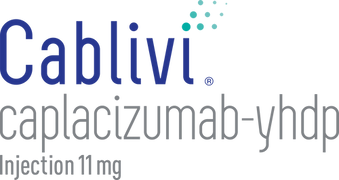
Sanofi is committed to individuals living with acquired/immune-mediated thrombotic thrombocytopenic purpura (aTTP/iTTP) and the healthcare professionals who support them.
As part of this commitment, the cost of CABLIVI will be refunded in the hospital setting for up to six (6) inpatient doses for patients who fail to reach initial clinical response to CABLIVI or up to twelve (12) inpatient doses for patients who exacerbate while on CABLIVI treatment, as defined by the program terms. Additional Eligibility Requirements, Terms and Conditions apply. CABLIVI must be administered according to the FDA-approved label (Prescribing Information). Refund amount will be up to the wholesale acquisition cost (WAC) or actual acquisition cost, whichever is less.
Backed by Sanofi Promise, recommended by ISTH Guidelines1-3*
The first evidence-based guidelines for aTTP/iTTP recommend CABLIVI,* the first and only FDA-approved therapy for adults in combination with PEX and immunosuppressive therapy, for acute aTTP/iTTP events—initial and relapsing.
*A conditional recommendation defined as desirable effects of the recommendation probably outweighing the undesirable effects. Assumes timely access to ADAMTS13 testing and clinical diagnosis based on high likelihood of aTTP/iTTP. In de novo patients where no reasonable access to ADAMTS13 activity testing is available, the Guidelines do not recommend CABLIVI; however, treatment of a patient previously diagnosed with aTTP/iTTP could be safely undertaken on clinical grounds without the need for a confirmatory ADAMTS13 test.2
If a patient is non-responsive to CABLIVI treatment within the inpatient setting, your institution may be eligible for a refund

ELIGIBILITY OVERVIEW
CABLIVI must be administered in the 50 United States, District of Columbia, or Puerto Rico and prescribed according to its FDA-approved label (Prescribing Information). CABLIVI treatment must be discontinued at the discretion of the healthcare provider for one of the following reasons
- Failure to Reach Initial Clinical Response: Patient experienced platelet counts <50 × 109/L, after 4 days of combined treatment with CABLIVI, PEX, and immunosuppressive therapy
- Exacerbation: Patient experienced a new drop in platelet count after initial platelet count normalization (>150 × 109/L), necessitating re‑initiation of PEX after having ruled out any causes for the drop in platelet count other than aTTP pathophysiology
Additional Eligibility Requirements, Terms and Conditions apply. Please see the full Terms and Conditions below.

FILING A CLAIM
To file a claim, you must fully complete and sign the Warranty Claim Form, Hospital Declarations and Authorizations Form, and Physician Attestation Form available below within 90 days following the patient becoming a non-responder to CABLIVI.
You can submit the forms by:
EMAIL: SanofiPromise@aig.com
FAX: 1-715-342-2405
MAIL: Travel Guard Assist, Inc., PO Box 845, Stevens Point, WI 54481-0047
Call 1-800-295-4010 Monday-Friday, 8 AM to 8 PM ET for any questions or to learn more about the Sanofi Promise Warranty Program for CABLIVI. Please review the full Terms and Conditions carefully before initiating the reimbursement process.
To successfully file a claim, the following 3 forms must be completed and submitted:
Terms and Conditions
Sanofi (referred to as “us”, “we” and similar terms) is proud to offer the Sanofi Promise Warranty Program for CABLIVI (the “Program”) to each institution that purchases CABLIVI (referred to as “you”, “your” and similar terms) and who meets the Eligibility Requirements and follows the Benefit Request Process described below (the “Terms”). You should carefully review these Terms. Coverage is subject to certain terms, conditions, and limitations, including limitations on the amount of coverage.
Overview of Program
For institutions who meet the Eligibility Requirements, the cost of CABLIVI will be refunded for up to six (6) inpatient doses for patients who fail to reach initial clinical response to CABLIVI or up to twelve (12) inpatient doses for patients who exacerbate while on CABLIVI treatment. Refund amount will be up to wholesale acquisition cost (WAC) or actual acquisition cost, whichever is less.
Medication Eligible for the Program
CABLIVI (caplacizumab-yhdp)
Eligibility Requirements
In order for you to be eligible to use the Program, you must satisfy all of the criteria listed below:
1. CABLIVI was administered in the 50 United States, District of Columbia, or Puerto Rico to a patient within the inpatient/institutional setting.
2. CABLIVI was administered, as prescribed by a health care provider, in accordance with its Food and Drug Administration (FDA) Prescribing Information, for the treatment of an adult patient with acquired thrombotic thrombocytopenic purpura (aTTP), in combination with plasma exchange and immunosuppressive therapy.
3. CABLIVI treatment was discontinued at the discretion of the health care provider for one of the following reasons qualifying the patient as a non-responder:
- Failure to Reach Initial Clinical Response: Patient experienced platelet counts <50 x 109/L, after 4 days of combined treatment with CABLIVI, therapeutic plasma exchange and immunosuppressive therapy. A maximum of six (6) inpatient doses may be refunded for such a non-responder patient.
- Exacerbation: Patient experienced a new drop in platelet count after initial platelet count normalization (>150 x 109/L), necessitating re-initiation of therapeutic plasma exchange after having ruled out any causes for the drop in platelet count other than aTTP pathophysiology. A maximum of twelve (12) inpatient doses may be refunded for such a non-responder patient for doses administered prior to drop in platelet count.
Discontinuation solely due to patient or institution choice, financial considerations, or any other reason does not qualify for the Program.
4. You purchased all doses of CABLIVI administered to the patient directly from a Sanofi authorized distributor.
5. You have not requested reimbursement from any third party (e.g., insurance company, Medicaid, Medicare, patient, etc.) for the acquisition cost of CABLIVI treatment subject to the Warranty.
6. CABLIVI treatment administered in an out-patient setting is not eligible for the Warranty.
7. The first dose of CABLIVI must be administered on or before June 30, 2026 (the “Coverage Period”).
8. You must submit proof of purchase and acquisition cost for all CABLIVI doses subject to the warranty claim.
9. Institution must submit all Claims Information (as described below) within ninety (90) days following the patient becoming a non-responder to CABLIVI.
10. Costs other than for the acquisition price of CABLIVI will not be reimbursed (i.e., administration costs).
11. You (unless you are a Federal health care program beneficiary as defined in 42 CFR § 1000.10) will fully and accurately report the amount refunded to you as part of the Program in the applicable cost reporting mechanism or claim for payment filed with the Department of Health and Human Services or a state Medicaid agency. Furthermore, you will provide, upon request by the Secretary of the Department of Health and Human Services or a state Medicaid agency, information provided to by us or our partners regarding the amount returned to you under the Program.
Benefit Request Process:
In order to be eligible for a refund under this Program, you must satisfy the requirements above and submit the information below (the “Claims Information”), within ninety (90) days following the patient becoming a non-responder to CABLIVI.
1. Call 1-800-295-4010 and a representative will provide you with a Warranty Claim Form, a Hospital Declarations and Authorizations Form, and a Physician Attestation Form, or these forms may be downloaded from CABLIVIWarranty.com.
2. You will then need to return a fully completed and signed (i) Warranty Claim Form, (ii) Hospital Declarations and Authorizations Form, and (iii) Physician Attestation Form in accordance with their instructions. Claims can be emailed to SanofiPromise@aig.com, faxed directly to 1-715-342-2405 or sent via mail to Travel Guard Assist, Inc., PO Box 845, Stevens Point, WI 54481-0047. For additional information on these forms, please visit CABLIVIWarranty.com.
3. If your Claims Information passes the verification process, we will notify you via telephone, email, or mail that you have been approved for coverage.
4. If your Claims Information does not pass the verification process, we will notify you via email that your Request has been denied and the email will include the reason for the denial (such as, incomplete information, mismatched information, etc.). You will be given the opportunity to resubmit your Claims Information within thirty (30) days of the email notification.
Additional Terms and Conditions
1. We reserve the right to modify the processes, procedures, parameters, or other terms of the Program, or terminate the Program entirely, at any time, without prior notice to you. If we terminate the Program, we will continue to honor valid claims related to initial doses of CABLIVI, prescribed by the physician, dispensed during the Coverage Period, unless prohibited by law. The current status of the Program and applicable terms are available on this website.
LIMITATION OF LIABILITY
IN NO EVENT, UNDER ANY CAUSE OF ACTION OF THEORY OF LIABILITY, SHALL SANOFI, ITS DISTRIBUTORS OR SUPPLIERS BE LIABLE TO YOU OR ANY THIRD PARTY FOR ANY INDIRECT, INCIDENTAL, CONSEQUENTIAL, SPECIAL, EXEMPLARY OR PUNITIVE DAMAGES, OF ANY NATURE WHATSOEVER, ARISING OUT OF OR IN CONNECTION WITH THE PROGRAM, EVEN IF SANOFI HAS BEEN ADVISED OF THE POSSIBILITY OF SUCH DAMAGES.
NOTWITHSTANDING ANY DAMAGES THAT YOU MIGHT INCUR FOR ANY REASON WHATSOEVER INCLUDING, WITHOUT LIMITATION, ALL DAMAGES REFERENCED HEREIN AND ALL DIRECT OR GENERAL DAMAGES IN CONTRACT, TORT (INCLUDING NEGLIGENCE) OR OTHERWISE, THE ENTIRE AGGREGATE LIABILITY OF SANOFI AND ANY OF ITS DISTRIBUTORS AND/OR SUPPLIERS SHALL BE LIMITED TO THE MAXIMUM AMOUNT SET FORTH ABOVE FOR THE PRODUCT THAT IS SUBJECT TO THE PROGRAM. SOME STATES AND/OR JURISDICTIONS DO NOT ALLOW THE EXCLUSION OR LIMITATION OF INCIDENTAL OR CONSEQUENTIAL DAMAGES, SO THE ABOVE LIMITATIONS OR EXCLUSIONS MAY NOT APPLY TO YOU. THE LIMITATIONS OF LIABILITY SET FORTH ABOVE SHALL APPLY TO THE MAXIMUM EXTENT PERMITTED UNDER APPLICABLE LAW.
ARBITRATION: Read the following arbitration provision (“Provision”) carefully. It limits certain of your rights, including your right to obtain relief or damages through court action.
To begin Arbitration, either you or we must make a written demand to the other party for arbitration for the applicable claim (“Claim”). The Arbitration will take place before a single arbitrator. It will be administered in keeping with the Expedited Procedures of the Commercial Arbitration Rules (“Rules”) of the American Arbitration Association (“AAA”) in effect when the Claim is filed. You may get a copy of these AAA’s Rules by visiting www.adr.org. The filing fees to begin and carry out arbitration will be shared equally between you and us. This does not prohibit the arbitrator from giving the winning party their fees and expenses of the arbitration. Unless you and we agree, the arbitration will take place in the county and state where you live. The Federal Arbitration Act, 9 U.S.C. Ch. 1, et seq., will govern and not any state law on arbitration. YOU AGREE AND UNDERSTAND THAT this arbitration provision means that you give up your right to go to court on any Claim covered by this provision. You also agree that any arbitration proceeding will only consider your Claim. Claims by, or on behalf of, other individuals will not be arbitrated in any proceeding that is considering your Claims. THE DEGREE TO WHICH ARBITRATION CAN BE USED AS A DISPUTE RESOLUTION PROCESS FOR CONSUMER CLAIMS VARIES FROM STATE TO STATE, SO THIS ARBITRATION PROVISION MAY NOT APPLY TO YOU, DEPENDING ON YOUR STATE OF RESIDENCE. In the event this Arbitration provision is not approved by the appropriate state regulatory agency, and/or is stricken, severed, or otherwise deemed unenforceable by a court of competent jurisdiction, you and us specifically agree to waive and forever give up the right to a trial by jury. Instead, in the event any litigation arises between you and us, any such lawsuit will be tried before a judge, and a jury will not be impaneled or struck.

Choose CABLIVI on day 1 in combination with PEX and immunosuppressive therapy

Stock or consign CABLIVI quickly and efficiently
Who should not start CABLIVI?
- CABLIVI is contraindicated in patients with a previous severe hypersensitivity reaction to caplacizumab-yhdp or to any of its excipients
- Withhold CABLIVI treatment 7 days prior to elective surgery, dental procedures, or other invasive interventions
ADAMTS13=a disintegrin and metalloproteinase with a thrombospondin type 1 motif, 13; FDA=Food and Drug Administration; ISTH=International Society on Thrombosis and Haemostasis; PEX=plasma exchange.
IMPORTANT SAFETY INFORMATION AND INDICATIONS
IMPORTANT SAFETY INFORMATION AND INDICATIONS
IMPORTANT SAFETY INFORMATION AND INDICATIONS
CONTRAINDICATIONS:
CABLIVI is contraindicated in patients with a previous severe hypersensitivity reaction to caplacizumab-yhdp or to any of its excipients. Hypersensitivity reactions have included urticaria.
WARNINGS AND PRECAUTIONS:
Hemorrhage:
- CABLIVI increases the risk of bleeding. In clinical studies, severe bleeding adverse reactions of epistaxis, gingival bleeding, upper gastrointestinal hemorrhage, and metrorrhagia were each reported in 1% of subjects. Overall, bleeding events occurred in approximately 58% of patients on CABLIVI versus 43% of patients on placebo.
- In the postmarketing setting cases of life-threatening and fatal bleeding were reported in patients receiving CABLIVI.
- The risk of bleeding is increased in patients with underlying coagulopathies (e.g. hemophilia, other coagulation factor deficiencies). It is also increased with concomitant use of CABLIVI with drugs affecting hemostasis and coagulation.
- Avoid concomitant use of CABLIVI with antiplatelet agents or anticoagulants. If clinically significant bleeding occurs, interrupt use of CABLIVI. Von Willebrand factor concentrate may be administered to rapidly correct hemostasis. If CABLIVI is restarted, monitor closely for signs of bleeding.
- Withhold CABLIVI for 7 days prior to elective surgery, dental procedures or other invasive interventions. If emergency surgery is needed, the use of von Willebrand factor concentrate may be considered to correct hemostasis. After the risk of surgical bleeding has resolved, and CABLIVI is resumed, monitor closely for signs of bleeding.
ADVERSE REACTIONS:
The most common adverse reactions (>15% of patients) were epistaxis (29%), headache (21%) and gingival bleeding (16%).
CONCOMITANT USE OF ANTICOAGULANTS OR ANTIPLATELET AGENTS:
Concomitant use of CABLIVI with any anticoagulant or antiplatelet agent may increase the risk of bleeding. Avoid concomitant use when possible. Assess and monitor closely for bleeding with concomitant use.
PREGNANCY:
There are no available data on CABLIVI use in pregnant women to inform a drug associated risk of major birth defects and miscarriage.
-
Fetal/neonatal adverse reactions: CABLIVI may increase the risk of bleeding in the fetus and neonate. Monitor neonates for bleeding.
-
Maternal adverse reactions: All patients receiving CABLIVI, including pregnant women, are at risk for bleeding. Pregnant women receiving CABLIVI should be carefully monitored for evidence of excessive bleeding.
INDICATIONS:
CABLIVI (caplacizumab-yhdp) is indicated for the treatment of adult patients with acquired thrombotic thrombocytopenic purpura (aTTP), in combination with plasma exchange and immunosuppressive therapy.
Please see full Prescribing Information.
Instructions For Use
Sharps Medical Waste Disposal (PDF)
Learn more about Sanofi’s commitment to fighting counterfeit drugs.
References: 1. Zheng XL, Vesely SK, Cataland SR, et al. ISTH guidelines for treatment of thrombotic thrombocytopenic purpura. J Thromb Haemost. 2020;18(10):2496-2502. doi:10.1111/jth.15010 2. Zheng XL, Vesely SK, Cataland SR, et al. ISTH guidelines for the diagnosis of thrombotic thrombocytopenic purpura. J Thromb Haemost. 2020;18(10):2486-2495. doi:10.1111/jth.15006 3. CABLIVI. Prescribing information. Sanofi.
IMPORTANT SAFETY INFORMATION AND INDICATIONS
CONTRAINDICATIONS:
CABLIVI is contraindicated in patients with a previous severe hypersensitivity reaction to caplacizumab-yhdp or to any of its excipients. Hypersensitivity reactions have included urticaria.
WARNINGS AND PRECAUTIONS:
Hemorrhage:
- CABLIVI increases the risk of bleeding. In clinical studies, severe bleeding adverse reactions of epistaxis, gingival bleeding, upper gastrointestinal hemorrhage, and metrorrhagia were each reported in 1% of subjects. Overall, bleeding events occurred in approximately 58% of patients on CABLIVI versus 43% of patients on placebo.
- In the postmarketing setting cases of life-threatening and fatal bleeding were reported in patients receiving CABLIVI.
- The risk of bleeding is increased in patients with underlying coagulopathies (e.g. hemophilia, other coagulation factor deficiencies). It is also increased with concomitant use of CABLIVI with drugs affecting hemostasis and coagulation.
- Avoid concomitant use of CABLIVI with antiplatelet agents or anticoagulants. If clinically significant bleeding occurs, interrupt use of CABLIVI. Von Willebrand factor concentrate may be administered to rapidly correct hemostasis. If CABLIVI is restarted, monitor closely for signs of bleeding.
- Withhold CABLIVI for 7 days prior to elective surgery, dental procedures or other invasive interventions. If emergency surgery is needed, the use of von Willebrand factor concentrate may be considered to correct hemostasis. After the risk of surgical bleeding has resolved, and CABLIVI is resumed, monitor closely for signs of bleeding.
ADVERSE REACTIONS:
The most common adverse reactions (>15% of patients) were epistaxis (29%), headache (21%) and gingival bleeding (16%).
CONCOMITANT USE OF ANTICOAGULANTS OR ANTIPLATELET AGENTS:
Concomitant use of CABLIVI with any anticoagulant or antiplatelet agent may increase the risk of bleeding. Avoid concomitant use when possible. Assess and monitor closely for bleeding with concomitant use.
PREGNANCY:
There are no available data on CABLIVI use in pregnant women to inform a drug associated risk of major birth defects and miscarriage.
-
Fetal/neonatal adverse reactions: CABLIVI may increase the risk of bleeding in the fetus and neonate. Monitor neonates for bleeding.
-
Maternal adverse reactions: All patients receiving CABLIVI, including pregnant women, are at risk for bleeding. Pregnant women receiving CABLIVI should be carefully monitored for evidence of excessive bleeding.
INDICATIONS:
CABLIVI (caplacizumab-yhdp) is indicated for the treatment of adult patients with acquired thrombotic thrombocytopenic purpura (aTTP), in combination with plasma exchange and immunosuppressive therapy.
Please see full Prescribing Information.
Instructions For Use
Sharps Medical Waste Disposal (PDF)
Learn more about Sanofi’s commitment to fighting counterfeit drugs.
References: 1. Zheng XL, Vesely SK, Cataland SR, et al. ISTH guidelines for treatment of thrombotic thrombocytopenic purpura. J Thromb Haemost. 2020;18(10):2496-2502. doi:10.1111/jth.15010 2. Zheng XL, Vesely SK, Cataland SR, et al. ISTH guidelines for the diagnosis of thrombotic thrombocytopenic purpura. J Thromb Haemost. 2020;18(10):2486-2495. doi:10.1111/jth.15006 3. CABLIVI. Prescribing information. Sanofi.
IMPORTANT SAFETY INFORMATION AND INDICATIONS
IMPORTANT SAFETY INFORMATION AND INDICATIONS
CONTRAINDICATIONS:
CABLIVI is contraindicated in patients with a previous severe hypersensitivity reaction to caplacizumab-yhdp or to any of its excipients. Hypersensitivity reactions have included urticaria.
WARNINGS AND PRECAUTIONS:
Hemorrhage:
- CABLIVI increases the risk of bleeding. In clinical studies, severe bleeding adverse reactions of epistaxis, gingival bleeding, upper gastrointestinal hemorrhage, and metrorrhagia were each reported in 1% of subjects. Overall, bleeding events occurred in approximately 58% of patients on CABLIVI versus 43% of patients on placebo.
- In the postmarketing setting cases of life-threatening and fatal bleeding were reported in patients receiving CABLIVI.
- The risk of bleeding is increased in patients with underlying coagulopathies (e.g. hemophilia, other coagulation factor deficiencies). It is also increased with concomitant use of CABLIVI with drugs affecting hemostasis and coagulation.
- Avoid concomitant use of CABLIVI with antiplatelet agents or anticoagulants. If clinically significant bleeding occurs, interrupt use of CABLIVI. Von Willebrand factor concentrate may be administered to rapidly correct hemostasis. If CABLIVI is restarted, monitor closely for signs of bleeding.
- Withhold CABLIVI for 7 days prior to elective surgery, dental procedures or other invasive interventions. If emergency surgery is needed, the use of von Willebrand factor concentrate may be considered to correct hemostasis. After the risk of surgical bleeding has resolved, and CABLIVI is resumed, monitor closely for signs of bleeding.
ADVERSE REACTIONS:
The most common adverse reactions (>15% of patients) were epistaxis (29%), headache (21%) and gingival bleeding (16%).
CONCOMITANT USE OF ANTICOAGULANTS OR ANTIPLATELET AGENTS:
Concomitant use of CABLIVI with any anticoagulant or antiplatelet agent may increase the risk of bleeding. Avoid concomitant use when possible. Assess and monitor closely for bleeding with concomitant use.
PREGNANCY:
There are no available data on CABLIVI use in pregnant women to inform a drug associated risk of major birth defects and miscarriage.
-
Fetal/neonatal adverse reactions: CABLIVI may increase the risk of bleeding in the fetus and neonate. Monitor neonates for bleeding.
-
Maternal adverse reactions: All patients receiving CABLIVI, including pregnant women, are at risk for bleeding. Pregnant women receiving CABLIVI should be carefully monitored for evidence of excessive bleeding.
INDICATIONS:
CABLIVI (caplacizumab-yhdp) is indicated for the treatment of adult patients with acquired thrombotic thrombocytopenic purpura (aTTP), in combination with plasma exchange and immunosuppressive therapy.
Please see full Prescribing Information.
Instructions For Use
Sharps Medical Waste Disposal (PDF)
Learn more about Sanofi’s commitment to fighting counterfeit drugs.
References: 1. Zheng XL, Vesely SK, Cataland SR, et al. ISTH guidelines for treatment of thrombotic thrombocytopenic purpura. J Thromb Haemost. 2020;18(10):2496-2502. doi:10.1111/jth.15010 2. Zheng XL, Vesely SK, Cataland SR, et al. ISTH guidelines for the diagnosis of thrombotic thrombocytopenic purpura. J Thromb Haemost. 2020;18(10):2486-2495. doi:10.1111/jth.15006 3. CABLIVI. Prescribing information. Sanofi.
IMPORTANT SAFETY INFORMATION AND INDICATIONS
CONTRAINDICATIONS:
CABLIVI is contraindicated in patients with a previous severe hypersensitivity reaction to caplacizumab-yhdp or to any of its excipients. Hypersensitivity reactions have included urticaria.
WARNINGS AND PRECAUTIONS:
Hemorrhage:
- CABLIVI increases the risk of bleeding. In clinical studies, severe bleeding adverse reactions of epistaxis, gingival bleeding, upper gastrointestinal hemorrhage, and metrorrhagia were each reported in 1% of subjects. Overall, bleeding events occurred in approximately 58% of patients on CABLIVI versus 43% of patients on placebo.
- In the postmarketing setting cases of life-threatening and fatal bleeding were reported in patients receiving CABLIVI.
- The risk of bleeding is increased in patients with underlying coagulopathies (e.g. hemophilia, other coagulation factor deficiencies). It is also increased with concomitant use of CABLIVI with drugs affecting hemostasis and coagulation.
- Avoid concomitant use of CABLIVI with antiplatelet agents or anticoagulants. If clinically significant bleeding occurs, interrupt use of CABLIVI. Von Willebrand factor concentrate may be administered to rapidly correct hemostasis. If CABLIVI is restarted, monitor closely for signs of bleeding.
- Withhold CABLIVI for 7 days prior to elective surgery, dental procedures or other invasive interventions. If emergency surgery is needed, the use of von Willebrand factor concentrate may be considered to correct hemostasis. After the risk of surgical bleeding has resolved, and CABLIVI is resumed, monitor closely for signs of bleeding.
ADVERSE REACTIONS:
The most common adverse reactions (>15% of patients) were epistaxis (29%), headache (21%) and gingival bleeding (16%).
CONCOMITANT USE OF ANTICOAGULANTS OR ANTIPLATELET AGENTS:
Concomitant use of CABLIVI with any anticoagulant or antiplatelet agent may increase the risk of bleeding. Avoid concomitant use when possible. Assess and monitor closely for bleeding with concomitant use.
PREGNANCY:
There are no available data on CABLIVI use in pregnant women to inform a drug associated risk of major birth defects and miscarriage.
-
Fetal/neonatal adverse reactions: CABLIVI may increase the risk of bleeding in the fetus and neonate. Monitor neonates for bleeding.
-
Maternal adverse reactions: All patients receiving CABLIVI, including pregnant women, are at risk for bleeding. Pregnant women receiving CABLIVI should be carefully monitored for evidence of excessive bleeding.
INDICATIONS:
CABLIVI (caplacizumab-yhdp) is indicated for the treatment of adult patients with acquired thrombotic thrombocytopenic purpura (aTTP), in combination with plasma exchange and immunosuppressive therapy.
Please see full Prescribing Information.
Instructions For Use
Sharps Medical Waste Disposal (PDF)
Learn more about Sanofi’s commitment to fighting counterfeit drugs.
References: 1. Zheng XL, Vesely SK, Cataland SR, et al. ISTH guidelines for treatment of thrombotic thrombocytopenic purpura. J Thromb Haemost. 2020;18(10):2496-2502. doi:10.1111/jth.15010 2. Zheng XL, Vesely SK, Cataland SR, et al. ISTH guidelines for the diagnosis of thrombotic thrombocytopenic purpura. J Thromb Haemost. 2020;18(10):2486-2495. doi:10.1111/jth.15006 3. CABLIVI. Prescribing information. Sanofi.
IMPORTANT SAFETY INFORMATION AND INDICATIONS
IMPORTANT SAFETY INFORMATION AND INDICATIONS
CONTRAINDICATIONS:
CABLIVI is contraindicated in patients with a previous severe hypersensitivity reaction to caplacizumab-yhdp or to any of its excipients. Hypersensitivity reactions have included urticaria.
WARNINGS AND PRECAUTIONS:
Hemorrhage:
- CABLIVI increases the risk of bleeding. In clinical studies, severe bleeding adverse reactions of epistaxis, gingival bleeding, upper gastrointestinal hemorrhage, and metrorrhagia were each reported in 1% of subjects. Overall, bleeding events occurred in approximately 58% of patients on CABLIVI versus 43% of patients on placebo.
- In the postmarketing setting cases of life-threatening and fatal bleeding were reported in patients receiving CABLIVI.
- The risk of bleeding is increased in patients with underlying coagulopathies (e.g. hemophilia, other coagulation factor deficiencies). It is also increased with concomitant use of CABLIVI with drugs affecting hemostasis and coagulation.
- Avoid concomitant use of CABLIVI with antiplatelet agents or anticoagulants. If clinically significant bleeding occurs, interrupt use of CABLIVI. Von Willebrand factor concentrate may be administered to rapidly correct hemostasis. If CABLIVI is restarted, monitor closely for signs of bleeding.
- Withhold CABLIVI for 7 days prior to elective surgery, dental procedures or other invasive interventions. If emergency surgery is needed, the use of von Willebrand factor concentrate may be considered to correct hemostasis. After the risk of surgical bleeding has resolved, and CABLIVI is resumed, monitor closely for signs of bleeding.
ADVERSE REACTIONS:
The most common adverse reactions (>15% of patients) were epistaxis (29%), headache (21%) and gingival bleeding (16%).
CONCOMITANT USE OF ANTICOAGULANTS OR ANTIPLATELET AGENTS:
Concomitant use of CABLIVI with any anticoagulant or antiplatelet agent may increase the risk of bleeding. Avoid concomitant use when possible. Assess and monitor closely for bleeding with concomitant use.
PREGNANCY:
There are no available data on CABLIVI use in pregnant women to inform a drug associated risk of major birth defects and miscarriage.
-
Fetal/neonatal adverse reactions: CABLIVI may increase the risk of bleeding in the fetus and neonate. Monitor neonates for bleeding.
-
Maternal adverse reactions: All patients receiving CABLIVI, including pregnant women, are at risk for bleeding. Pregnant women receiving CABLIVI should be carefully monitored for evidence of excessive bleeding.
INDICATIONS:
CABLIVI (caplacizumab-yhdp) is indicated for the treatment of adult patients with acquired thrombotic thrombocytopenic purpura (aTTP), in combination with plasma exchange and immunosuppressive therapy.
Please see full Prescribing Information.
Instructions For Use
Sharps Medical Waste Disposal (PDF)
Learn more about Sanofi’s commitment to fighting counterfeit drugs.
References: 1. Zheng XL, Vesely SK, Cataland SR, et al. ISTH guidelines for treatment of thrombotic thrombocytopenic purpura. J Thromb Haemost. 2020;18(10):2496-2502. doi:10.1111/jth.15010 2. Zheng XL, Vesely SK, Cataland SR, et al. ISTH guidelines for the diagnosis of thrombotic thrombocytopenic purpura. J Thromb Haemost. 2020;18(10):2486-2495. doi:10.1111/jth.15006 3. CABLIVI. Prescribing information. Sanofi.
IMPORTANT SAFETY INFORMATION AND INDICATIONS
CONTRAINDICATIONS:
CABLIVI is contraindicated in patients with a previous severe hypersensitivity reaction to caplacizumab-yhdp or to any of its excipients. Hypersensitivity reactions have included urticaria.
WARNINGS AND PRECAUTIONS:
Hemorrhage:
- CABLIVI increases the risk of bleeding. In clinical studies, severe bleeding adverse reactions of epistaxis, gingival bleeding, upper gastrointestinal hemorrhage, and metrorrhagia were each reported in 1% of subjects. Overall, bleeding events occurred in approximately 58% of patients on CABLIVI versus 43% of patients on placebo.
- In the postmarketing setting cases of life-threatening and fatal bleeding were reported in patients receiving CABLIVI.
- The risk of bleeding is increased in patients with underlying coagulopathies (e.g. hemophilia, other coagulation factor deficiencies). It is also increased with concomitant use of CABLIVI with drugs affecting hemostasis and coagulation.
- Avoid concomitant use of CABLIVI with antiplatelet agents or anticoagulants. If clinically significant bleeding occurs, interrupt use of CABLIVI. Von Willebrand factor concentrate may be administered to rapidly correct hemostasis. If CABLIVI is restarted, monitor closely for signs of bleeding.
- Withhold CABLIVI for 7 days prior to elective surgery, dental procedures or other invasive interventions. If emergency surgery is needed, the use of von Willebrand factor concentrate may be considered to correct hemostasis. After the risk of surgical bleeding has resolved, and CABLIVI is resumed, monitor closely for signs of bleeding.
ADVERSE REACTIONS:
The most common adverse reactions (>15% of patients) were epistaxis (29%), headache (21%) and gingival bleeding (16%).
CONCOMITANT USE OF ANTICOAGULANTS OR ANTIPLATELET AGENTS:
Concomitant use of CABLIVI with any anticoagulant or antiplatelet agent may increase the risk of bleeding. Avoid concomitant use when possible. Assess and monitor closely for bleeding with concomitant use.
PREGNANCY:
There are no available data on CABLIVI use in pregnant women to inform a drug associated risk of major birth defects and miscarriage.
-
Fetal/neonatal adverse reactions: CABLIVI may increase the risk of bleeding in the fetus and neonate. Monitor neonates for bleeding.
-
Maternal adverse reactions: All patients receiving CABLIVI, including pregnant women, are at risk for bleeding. Pregnant women receiving CABLIVI should be carefully monitored for evidence of excessive bleeding.
INDICATIONS:
CABLIVI (caplacizumab-yhdp) is indicated for the treatment of adult patients with acquired thrombotic thrombocytopenic purpura (aTTP), in combination with plasma exchange and immunosuppressive therapy.
Please see full Prescribing Information.
Instructions For Use
Sharps Medical Waste Disposal (PDF)
Learn more about Sanofi’s commitment to fighting counterfeit drugs.
References: 1. Zheng XL, Vesely SK, Cataland SR, et al. ISTH guidelines for treatment of thrombotic thrombocytopenic purpura. J Thromb Haemost. 2020;18(10):2496-2502. doi:10.1111/jth.15010 2. Zheng XL, Vesely SK, Cataland SR, et al. ISTH guidelines for the diagnosis of thrombotic thrombocytopenic purpura. J Thromb Haemost. 2020;18(10):2486-2495. doi:10.1111/jth.15006 3. CABLIVI. Prescribing information. Sanofi.



